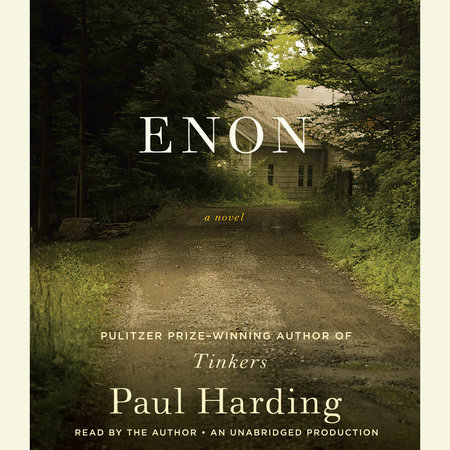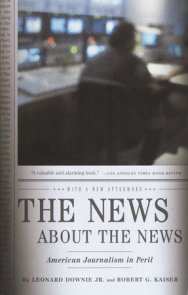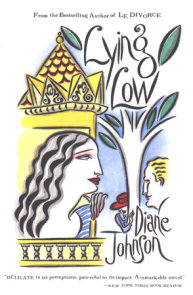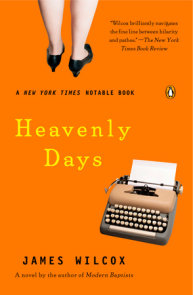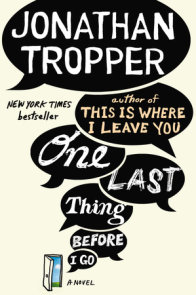READERS GUIDE
A Conversation Between Paul Harding and Shelf Unbound
The following interview appeared in the February/March 2014 issue of Shelf Unbound.
Shelf Unbound: You dispense with the obvious plot line in the first chapter: Charlie Crosby’s thirteen-year-old daughter is killed in an accident and his wife leaves him. The rest of the novel unfolds the myriad ways Charlie attempts to distance himself from his pain but not from the memory of his daughter. How did you go about structuring the novel?
Paul Harding: Pretty much just as you describe. I wanted to lay all of the cards on the table, right up front, so there was nowhere to hide. The first paragraph is like the opening of an old newspaper article: who, what, why, when, where. It’s one thing to know all of the facts, one thing to understand the facts intellectually, abstractly, as, say, “tragic.” It’s another thing, though—the job of a novel, a work of art—to describe the human implications of those facts, the experience of them by a particular, imperfect human being. It was also one of those challenges you set for yourself as a writer, because such challenges are why you write; the language and the art are there because they have the capacities to explore the impossible facts of human experience, in this case of tragedy. How possibly to express the impossible fact of losing your daughter? A voice breaks the silence and begins an attempt at an account. . . .
The structure of the novel emerged as I listened to Charlie tell the story, one sentence at a time. I think of the book as a confession, like St. Augustine’s—one voice speaking in-timately and directly, in good faith, to the reader, trying to account for the speaker’s actions, as flawed and troublesome as they might be. I didn’t want there to be any layers of narrative between the reader and Charlie’s experience. It had to be direct, because so much of the book is about Charlie trying to figure out how to be equal to the tragedy of losing his child, how to improvise a new language, a new perspective, a new, heartbroken humanity out of what remains. His response is fragmented and off-balance and radically disoriented, full of advances and retreats and redoubts and descriptions of how, to paraphrase Shakespeare, his heart is not confederate with his hand, and that is reflected in how the book is structured. There’s no overseeing narrator next to or, perish the thought, above him, tidying things up, smoothing things over for the reader. It’s raw, in real time. The book was also always a monologue—again, a single voice speaking directly to the reader. It is meant to read like a book from the Bible: a psalm; a hymn; an incantation, a prayer; a lamentation.
SU: Your debut novel, Tinkers, won the Pulitzer in 2010. How did the weight of expectation for Enon impact your experience of writing it and perhaps even the novel itself?
PH: I was lucky in that Random House had bought Enon and I was seventy-five or so pages into a draft before Tinkers won the Pulitzer. That and the fact that the editor who bought the book, Susan Kamil, had not read Tinkers before she picked up Enon helped a lot. Whenever the gravitational pull of Tinkers threatened to distract me from the particular difficulties of composing Enon, I was able to go back to those first seventy-five pages and remind myself, Whatever the solution, it lies in here, not in Tinkers.
As far as the worldly distractions of following up a successful debut and so forth, I didn’t let them worry me much. Publishing is a rowdy, contact sport, and I’m just as opinionated as the next reader about what books I think are solid works of art or clever, depthless sleight of hand. After the feel-good story behind Tinkers, I knew that no matter what there’d be some, um, blowback, so I just ignore it. Tinkers took guff before and after the prize, Enon will take its fair share of guff, too, and that’s how it is. I always tell my writing students, don’t write your books for readers who won’t like them, and don’t write your books for bad readers. Enon is consistent with its own terms, not Tinkers’s terms, and that’s bound to fluster some people. I was a drummer in a kind of second- or third-tier touring rock band for years, and once you’ve had the piss taken out of you by, for example, the English rock press, a snippy notice from, as William Hazlitt described it, a reviewer engaging in irrelevant smartness at the writer’s expense seems downright quaint. Really, I should be so lucky that my biggest problem is dealing with following up a Pulitzer Prize–winning debut novel, you know?
SU: Charlie is the grandson of the main character in Tinkers. Why did you decide to revisit this family and to continue exploring themes of time, loss, and nature?
PH: Well, the book came to me as a visual image accompanied by a version of that first paragraph. Or the first paragraph contains the fundamental facts that I understood from the visual image, which was a sort of black paper silhouette cutout of a steep hill studded with gravestones and the figure of a man skulking across its crown, under the moon and stars. I knew all at once that it was the Enon cemetery, that the man was Charlie Crosby, that he was scurrying home after a night of misadventure, that his daughter was buried below at the bottom of the hill, and that he was sneaking behind her grave because he was ashamed of who he had become since she died. It was a fairly traditional, classic, mythical, legendary story, like Orpheus, like Persephone. From there it was just a matter of quietly listening for, then to, his voice, of listening and watching as he attempts to reckon with what happened.
Thematically, time, loss, nature, memory are what I find myself always obsessing over. Those things are the hallmark mysteries of our fraught human careers. They are essential and irreducible. With Enon, I also found myself putting pressure on things like belief. In what do we believe? How is belief constructed? How does it persist or corrode? What is belief? What happens when the world in which we believe, or think we believe, assume we believe, evaporates? Charlie enacts all of these improvised personal rituals; it’s like he conjures or improvises a religion based on the worship of his dead daughter, something he understands is bad news, but in which he nevertheless persists for some time. And that fascinated me, too—the discrepancy between what we know and what we do. He knows better than he acts. It’s St. Paul, the evil which I do not want to do is that which I do, and the good I mean to do is that which I do not do.
SU: Charlie medicates himself with whiskey and too many pills, passing out each night on his living room sofa and waking up to experience his tragedy anew. In Tinkers, his dying grandfather is moored in a hospital bed in his living room. Did you purposefully choose the same room of the house for them to decay in?
PH: I never thought of that! It makes perfect sense, though. Both novels are domestic, centered on domestic, family life. The living rooms in both cases are kind of like the ruins of former, intact homes, homes and families that we find in the process of dissolution. That’s the kind of thing I’d never purposefully decide on. It just made sense to me that Charlie would not want to sleep in his bed, upstairs, where he and his estranged wife slept, near where his deceased daughter slept. He is kind of exiled to the living room.
SU: You are often cited for your gorgeous writing style, for your inventive and poetic imagery and use of metaphors. Take this one sentence near the end of the novel, with Charlie assessing the ways he has imagined his daughter to keep her alive: “They were fetishes, cobbled together by a mind clumsy with drugs and sorrow, and shaken in terror like rattles at the immense and exact unfolding of my daughter’s true absence elaborating itself in the world.” That, like many of your sentences, is one to swoon over. What is your starting point and process for writing such a sentence?
PH: I think of every sentence as its own little cosmos, its own little self-sufficient system. I try to find the internal laws, the eternal truths of each sentence, from within inside. So they build up in these weird, nonlinear ways, where I start out with a subject in mind and then find out that what I thought was the subject is in fact a part of the predicate of a deeper, previously submerged subject that has surfaced in the process of orbiting around it, and once it surfaces I need to circle back around to the beginning and rig everything around that, and sometimes in the process of doubling back I find that that is not the subject but yet another part of this elaborate system of predicates, and so on. I love the capacity of single words and I love the capacity of the sentence. And then the sentences all start to circle around larger themes and preoccupations of the character and the author, and so forth. The sentence you cite, for example, arose from thinking about idols—thematically, like “idolatry” and what that means theologically, et cetera, but also literally, as in dolls, little figurines, little fetishes, that are supposed to contain the spirit or soul or divinity they invoke, but cannot, are too small, are reductive and, as it were, blasphemous to the integrity or in this case memory of the soul they represent. Charlie understands that the little rag-doll versions of Kate he keeps making up are no way to commemorate her, are a kind of self-indulgent violence against her, although he keeps trying to make better, sufficient ones for a good while, until he begins to realize that there is a true, even more terrifying grandeur to her literal absence. I’ve been interested in William James’s interest in Hegel’s dialectics, how absence and presence, say (being and nonbeing, in theoretical, generic philosophical terms), only embody their meanings relative to one another. There is no such thing as “absence” in general, any more than there is such a thing as “grief” in general, or “evil.” These are not abstract metaphysical concepts but concrete manifestations of human action and experience. Every absence is the absence of something specific (in the same way that “grief” and “evil” are not just these clouds floating around the world that envelop people but are direct human experiences or acts). Anyway, that won’t do for a novel, which works through character, character, character, not argument or rhetoric or theory, so it ends up being dramatized, made immanent in Enon as the absence of a daughter, the one, the only daughter, Kate, and no one else. That means that Kate’s absence is as detailed, and precise, and intricate, and precious as her presence. And that’s an earth-shattering, terrifically frightening, but authentic revelation to Charlie. I didn’t think all this up deliberately beforehand, it just emerged over the course of composing the book; I thought about what Charlie thought about what I thought about, and so forth, and each moment just arose from the process of pondering it in the context of Charlie sitting in his living room and walking around within the boundaries of the village. Every sentence was a little crucible for a new permutation of these ideas, in the context of how a fictional character experienced them on a literal, visceral, immanent level, how he tried to be equal to these tragic circumstances.
At any rate, that’s maybe a bit much, but it illustrates the genesis of that sentence.
SU: Do you plan to write about this family again?
PH: The problem I’ve left myself with is that, in the course of isolating Charlie so that I could have this solitary guy confronting existence and so forth, I killed everyone else off! If I write more about the Crosbys, I guess I’ll have to go back in time or something. At the moment I’m just floating around the house, reading this and that, taking notes, fiddling around with two or three vague ideas, hoping a voice will begin to speak from inside one of them. It’s mysterious and fun and engrossing in a way that nothing else is.
Following the interview, Paul Harding had one more response to add, to a question often asked:
Question: Charlie’s abuse of drugs and alcohol figures prominently in the action of the novel. To what extent are his character or his actions defined by themes of addiction and recovery?
PH: Charlie is a regular, unremarkable man who grieves and who plausibly and understandably attempts to buffer his grief with liquor and drugs because they are within arm’s reach. He eventually puts the liquor and drugs away because he understands their increasingly corrosive effects. So the booze and pills are certainly in the foreground of the narrative, and they influence the action and Charlie’s perceptions. My main concern was striking the right balance between the simple fact of Charlie’s drug and alcohol abuse and the popular, quasi-clinical language of recovery and addiction. Such language obliterates nuance and individuality. It is generally coarse and unbeautiful and it’s a kind of categorical mistake to subject the book to its terms. Enon is a novel, not a psychology text; an aesthetic composition, not a clinical report or therapeutic model. Fiction works best when written and understood in terms of character, in terms of the human soul, the heart, and consciousness. To my thinking, everything else is a predicate of character—secondary, tertiary, even—and must be given its proper weight relative to the proper subject, this particular man. Any theoretical reading is bound to prove deficient, therefore, because it makes the man a predicate of some generalized ideal. Subordinating Charlie to any theory can only make his exceptions in conforming to it failures, rather than the very actions that make him recognizable as an imperfect, individual soul, struggling, improvising, trying in good but often enough hobbled faith to be equal to his lot, as all of us in fact do in our own lives. In such readings Charlie ends up being a kind of patient offered up for diagnosis rather than as a unique human being.
All that said, I am a practical guy. I understand that the surface, so to speak, of the novel is steeped in the dude getting wasted. It’s a real issue. I just want to make sure that readers avoid reductive readings, that they make it past that surface into the depths and real complexities of Charlie’s lived experience.
Questions and Topics for Discussion
1. Enon begins with Kate’s death. Why do you think Paul Harding put her death up front? How did facing her death on the first page affect your reading of the novel and your expectations for the plot?
2. Much of the story involves Charlie’s family history and connections to the past, but without Kate and Susan, Charlie is the last Crosby in Enon: “My whole family made a circumference of ghosts, with me the sole living member in the middle.” How does this fact add to and change how he mourns his daughter?
3. What role has the town of Enon itself played in Charlie’s life? How does the place contain and amplify his grief?
4. As Charlie spirals deeper into his despair and into addiction, he feels shame for what he has become and how his life has decayed. What does Charlie’s story have to say about the personal responsibility of a grieving person? To whom does he feel responsible? Are there boundaries to dealing with loss?
5. While remembering Kate, Charlie also imagines different scenarios in which she is alive, including a scene where he imagines multiple Kates. How do these imagined scenes reflect Charlie’s grief or his real life in any given moment?
6. Harding writes many beautiful passages to convey Charlie’s inner life. How does Harding’s writing immerse readers directly in Charlie’s life? Are there any passages in particular that made his experience real for you?
7. At the end of the book, Charlie faces two anniversaries—a year since Kate’s death, and her fourteenth birthday. He is then recovering from his addictions. What turned Charlie toward recovery? How does he begin to turn things around?
8. Charlie lets Susan go with relatively little struggle. It becomes clear early on that while Susan and Charlie loved each other, Kate bound them together. What do you think of the way Susan’s response to Kate’s death is portrayed, and of her separation from Charlie?
9. How do drugs change Charlie and how he handles loss?
10. Throughout the novel, Charlie creates routines to help him get from day to day. How do his routines help him cope with his loss? How do they serve both to isolate him from the world and, later, to help him re-enter it?









